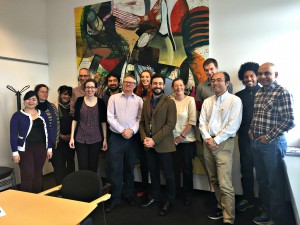 Beginning of June I came to the CFS, in order to work with other phenomenologists. My stay here was also part of my sabbatical at the Free University Berlin, and my plan was to concentrate on my monograph on the “Sense of Appropriateness”, that I had begun to work on already four years ago, but which was always interrupted by my usual teaching, grading, and administrative workload. I thought a time, away from my office desk in Berlin, would give me the necessary focus to delve into this project.
Beginning of June I came to the CFS, in order to work with other phenomenologists. My stay here was also part of my sabbatical at the Free University Berlin, and my plan was to concentrate on my monograph on the “Sense of Appropriateness”, that I had begun to work on already four years ago, but which was always interrupted by my usual teaching, grading, and administrative workload. I thought a time, away from my office desk in Berlin, would give me the necessary focus to delve into this project.
I have stayed at the Center for five weeks, and it was wonderful to work here in such an open-minded, relaxed and yet so much dedicated atmosphere.
At the CFS Whole Day Seminar, June 7, I’ve got my first impression about the work of the members and visitors of the Center. I have joined the CFS Philosophy of Emotions Reading Group, in which we were discussing Deonna & Terroni’s book Emotions. It was very fruitful to discuss their sophisticated argumentation for their attitudinal theory of emotions, and I received many inspirations for my own work about the phenomenology of emotions. Additionally, it proved to be important for my work about the sense of appropriateness, which I conceptualize as an emotional capability. According to this account, there are analogous or similar questions about evaluating situations involving emotions and the very issue of the sense of appropriateness.
In June, I have also attended Jo-Jo Koo’s talk about Sein und Zeit. He presented a novel interpretation of Eigentlichkeit and Uneigentlichkeit, suggesting the notion of Indifferenz as a third category and conceptualizing these three concepts as a continuum. The talk of Jeff Malpass (June 27) about “Topology, Hermeneutics and the Transcendental” was also inspiring– and not to forget our Summer Outing!
But the most stimulating event during my stay was certainly the workshop about „We and you“, June 13-14. The papers of Dan Zahavi, David Bakhurst, Naomi Eilan, Mattia Gallotti, Barbora Siposova and Malinda Carpenter had been sent out to the participants before the meeting. This way of preparing a workshop seems to me ideal, as it facilitates a much more intensive debate. For example, in their paper, Siposova and Carpenter differentiate between individual, parallel, common, joint and shared attention, and I believe these distinctions can also very much contribute to the debate on shared emotions. The reasons is not so much that shared attention seems to be a precondition for sharing emotions; moreover, I contend that if one maps these categories onto emotions and affects they allow for a better phenomenological description of shared emotional phenomena. I think there is a tight connection between aspects of this differentiation and the description of bodily interaction (in the sense of leibliche Interaktion: “interaction of the felt bodies”), which, in my view, is fundamental for shared emotions.
During my time here I had to evaluate a Habilitationsschrift, the second monograph of a colleague, and consisting of 350-pages, about the concept of Erfahrung from a historical and systematic perspective (but, unfortunately, without considering phenomenology), obviously, this consumed quite a lot of my time during my first two weeks in Copenhagen. At the beginning of my visit here, I could finish two papers, one about shame and the feeling of being humiliated, and one about “Therapeutik der Affekte. Leibliche Resonanz und Gemeinschaftsgefühle als Bewältigungsstrategien” (“Therapy of Affects – Bodily Resonance and Shared Emotions as Coping Strategies”) for two edited volumes.
As a further central project of my time at the CFS, I have co-edited, together with Isabella Marcinski (Freie Universität Berlin) a forthcoming volume „Dem Erleben auf der Spur. Feminismus und die Philosophie des Leibes“ (transcript, Bielefeld 2016). Now, the connection between feminist theory and phenomenology immediately suggests itself, because for both “body” and “experience” are central concepts. Both also question the being-taken-for-granted of our everyday experience and discuss the typically unquestioned pre-conditions implied. The third commonality is that they presuppose a subject who is always and already embodied and embedded in the social world. In other words, the subject is situated, dependent on others and, importantly, vulnerable. This is the starting point for both theoretical frameworks.
The co-edited volume gathers about fifteen contributions in the field of feminist phenomenology. The contributors to the volume are: Sabine Doerpinghaus, Ute Gahlings, Robin May Schott, Jan Slaby, Linda Fisher, Maren Wehrle, Christina Schuees, Debra Bergoffen, Robert Gugutzer, Íngrid Vendrell Ferran, Tanja Staehler, Isabella Marcinski, Luna Dolezal, Alia Al Saji.
And, last but not least, Thomas Szanto and I have developed a detailed synopsis for a co-edited handbook, which we have recently submitted for a review to a large international publisher – but I’m sure that, in case of success, Thomas will present the volume in this blog later.
Summarizing, I’ve simply had a wonderful and productive time with lots of intellectual exchange and inspirations at the Center, and I am very grateful for having received this possibility!